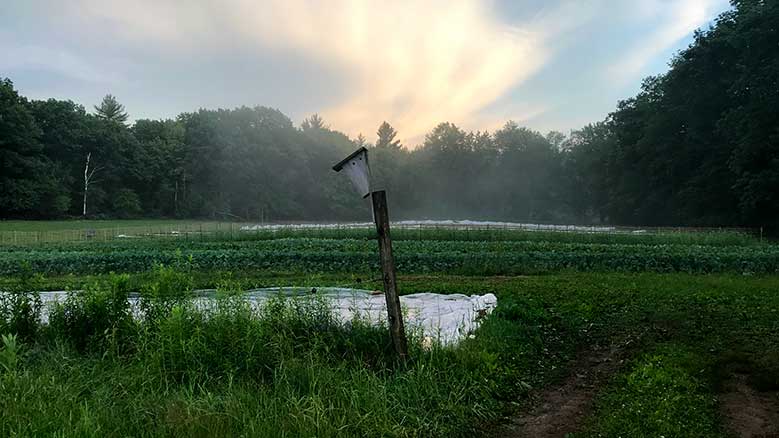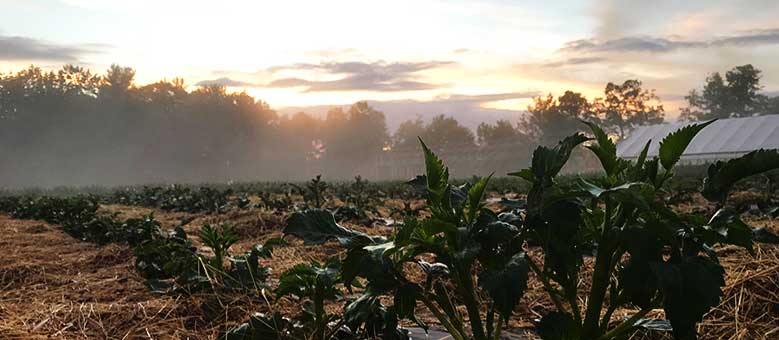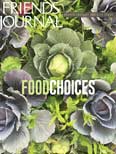
Part One: Craig Jensen
2014 was a bad tomato year for Sun Moon Farm. We increased the number of plants in the field but had the lowest yield in our nine seasons of vegetable farming. Late blight is a fungal infection that generally doesn’t overwinter here in New Hampshire; if we see it, it’s usually only very late in the season, when spores travel north on summer weather fronts after the crop is well established and the harvest is well begun. But in 2014, our plants were showing symptoms early in August and had almost all collapsed by the end of that month. The disease was probably unintentionally brought north on infected commercial nursery plants. Our farm is half a mile from a big-box store, and some home gardeners in the area were no doubt tempted by big, showy southern-grown plants that would start bearing fruit before we’d even moved our seedlings out of the greenhouse.
The result was that after the first pick, we had almost no tomatoes to offer our customers. If Sun Moon Farm were primarily a market farm, that loss could have put us out of business.
We’re too small to afford commercial crop insurance, but as a Community Supported Agriculture (CSA) farm, the families we feed provide a necessary insulation against this sort of disaster. As CSA growers we have permission and incentive to be very diversified; we’re trying to offer a full taste of what New Hampshire can offer rather than chasing a shorter list of the most lucrative crops. I wrote about late blight in our weekly farm letters as soon as I noticed it, so our members understood what was happening, and our intentional diversity allowed us to continue filling the shares even when we had no tomatoes to offer. As a result, the season was an overall success, and we had really good customer retention in 2015.
Every year, starting in January, we encourage local families to pre-purchase their 20 weeks of vegetables (mid-June through October). Their money is then available to the farm in the late winter and early spring when the farm is making most of its purchasing decisions. The customers’ commitment lets us know who we are growing for at the time when we are buying and starting seeds. With prearranged buyers for all that we grow, we don’t have the spoilage and food waste that is common after a poor day at the market, and we become a much more efficient operation. Families that commit to our CSA agree to share in the inherent risks of farming. They know that we’ll do our best work to prepare for such contingencies and that we’ll use growing techniques that protect the harvest, minimize risk to our members, and optimize the rewards. The farm and farmers ultimately have a better chance of long-term success (and continuing to provide a clean, local food option for our community) when unavoidable short-term risks like an early frost, drought, crop failure, or an illness or injury to the grower are distributed among more people who care about our local small farm.
Our local shares cost $25 a week for the 20-week season and include at least ten different items per week. Sun Moon Farm accepts SNAP benefits (Supplemental Nutrition Assistance Program), and thanks to the Market Match program, SNAP purchasers double their purchasing power when buying directly from the farm. With the support of our members, Sun Moon Farm also offers reduced cost and no-pay shares through our local food pantry. I’m not interested in trying to compete with supermarkets on price, but we do aim to keep our food accessible without being “cheap food.”
I am more interested in encouraging Friends to pursue high value with their food purchases. For a few years now, we’ve been saying that community is our primary crop, and we’ve started to encourage customers to think about food as just one of the many benefits that they get when they choose to support a community farm. In addition to providing high-quality organic produce, Sun Moon Farm hosts a weekly potluck dinner, a barn party in the summer, and candlelight worship on the winter solstice. We’ve made the front of our barn into a library, and that physical space—and the occasion to see neighbors at the CSA pickup—has made Sun Moon Farm a valuable community hub in our rural area. I also deliver to friends in Cambridge, Massachusetts, and my relationship with a cohousing community there has allowed a similarly connected experience for our city customers. (See below!)
CSA membership is also a choice to support stewardship of open space in a rapidly developing part of southern New Hampshire where our organic farm is a valuable habitat for many species of flora and fauna. Sun Moon Farm is intentionally small and intensely focused on local conditions. With a business model that encourages strong relationships with our customers and with our commitment to this particular property, I believe that we will continue to play a necessary role in building a resilient community here. I worry that with a warming climate and fewer frost days, New Hampshire farms—especially organic growers like Sun Moon Farm—will be more susceptible to overwintering pathogens, like late blight. I worry that heavier but less frequent rainfall, and increased droughts like we had here in 2016, will make germination and harvests less predictable (and therefore more costly). And I believe that the right response to these risks, as well as other signs of environmental and social instability, is a deeper investment in community. I believe that CSA membership is an easy and effective way to do just that.
I’ve heard Friends say that a CSA share wouldn’t work for them because they want more choice. They worry about too much kale or kohlrabi, or they don’t want to commit to a weekly pickup. At Sun Moon Farm we consider what grows well on this land and also what our customers tell us they want to eat. Personally, I think we do a good job of balancing the shares; we also usually offer an opportunity to swap things out, and any food not claimed is taken to our local food pantry. But I also think that CSA membership is about a more important choice: it’s the choice to support sustainable farming and healthy families, to actively value the natural world, and to foster connected and resilient communities that our world needs.

Part Two: Suzanna Schell
“Farmer Craig, Farmer Craig!” calls child after child as they bound up the driveway on Tuesday afternoons in the growing season. Farmer Craig is Craig Jensen of Sun Moon Farm CSA in Rindge, New Hampshire, and the driveway is in Cornerstone Village Cohousing in North Cambridge, Massachusetts. Every Tuesday afternoon from mid-June to the end of October, Farmer Craig arrives with a bounty of farm fresh vegetables and home-baked bread, and later in summer, glorious flowers. Our driveway is transformed into a farmstand with tables of fresh vegetables displayed under a blue awning.
The Sun Moon Farm CSA is a very tangible connection between urban and rural, an extended community drawn together by food but also by the desire to know and experience where our food comes from and to know those dedicated souls who get up early—rain or shine, hot or cold—to till, tend, and harvest our food.
Sun Moon Farm is not the only CSA that delivers to my neighborhood. I’m sure they all grow delicious food with great care. But it is the very personal connection that Craig makes with those of us who are his customers and, as time goes by, his friends and fellow community members, that make Sun Moon Farm CSA special.
I often say that Craig knows more people in my neighborhood than I do, especially the kids. And it is the kids who pull their parents up the walk to the farm stand each week. Farmer Craig’s first day each June is like the first day of school when you notice how much a particular child has grown. A toddler has suddenly become a first grader able to weigh a pound of tomatoes or count out five beets and two bunches of radishes to fill this week’s bag of produce.
For some of us, belonging to Sun Moon Farm is a chance to get our hands dirty. Many members visit the farm to help with transplanting or weekly harvesting. My young neighbor Ellie (age six) is especially fond of the carrots she helped to thin last year and loves to help customers weigh their produce and fill their bags each week.
I first met Craig and Megan at Woolman Hill during Climate Spring, a gathering of Friends and others concerned with the threat of climate change. The first morning, Craig and I were in a small breakout group where we shared what brought us there. Craig shared his leading as a “Quaker farmer” with a ministry of food and community as part of the solution for healing our earth, our community, and ultimately our souls. When I learned that he was looking for a new location for a drop-off in the city, I knew that my cohousing community would be a perfect match for Sun Moon Farm, both as a location and as an extended community.
Sometimes community happens spontaneously when someone sees the Sun Moon Farm CSA sandwich board at the foot of our driveway and wanders in to take a look. Last summer, Daniel, who was visiting his girlfriend who lives around the corner, was out for a walk when he saw the Sun Moon Farm stand. Daniel is from Colombia, where he lives in a permaculture community, so he was naturally curious to learn more about a farm stand in the middle of an urban residential neighborhood. After hanging out with Craig for a while, Daniel grabbed his overnight bag and jumped in the farm van for the trip back up to New Hampshire where he spent the next few days helping out on Sun Moon and a neighboring farm. The following week, Daniel returned to our driveway farm stand and sold handcrafts, pottery, and organic coffee from his community in South America. I now carry my water bottle in a small string bag I bought from him. His coffee was delicious, too.
In another part of my Quaker life, I co-clerk the New England Yearly Meeting Legacy Gift Committee, which oversees a funding program that supports the ministries of New England Quakers. Sun Moon Farm was an early grantee that received a grant to buy a small tractor and convert it to solar electric power. The project was supported by Monadnock (N.H.) Meeting—another example of the beautiful web of an extended community at work in support of his ministry as a Quaker farmer. His weekly “Farm Letters” are an opportunity to not only share the ongoing work and cycle of the farm but also explore larger economic justice issues about how we value our time and land.
Last March, more than 50 members of the extended Sun Moon Farm community helped to erect a 100-foot, giant hoop house that enables the farm to extend their growing season. Young and old, urban and rural worked together in a modern-day barn raising to support “our farm” and “our farmers.” It was a joyful gathering and sharing of the web of community.
We ended the year with the annual solstice circle meeting for worship and potluck. I drove up from Cambridge with a neighbor from down the street. It was a wonderful time to get to know her better during the hour-long drive. And it was a deeply communal way to end the year with hope and gratitude for the harvest and the turning of the light with others connected to this special piece of land where our food comes from. I am deeply grateful for the continued unfolding of community that has come from the relationship between our two worlds and the vision of what is possible.










Comments on Friendsjournal.org may be used in the Forum of the print magazine and may be edited for length and clarity.